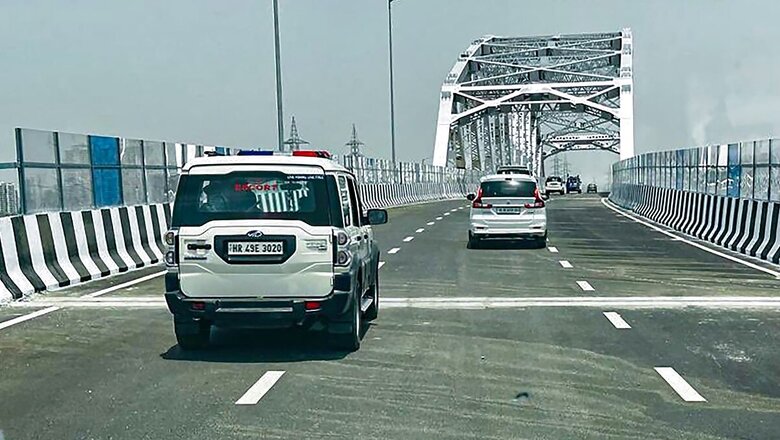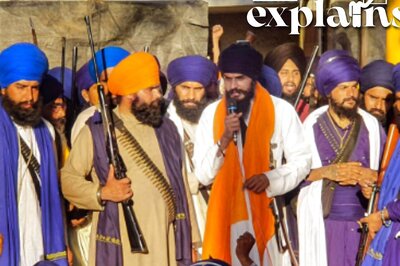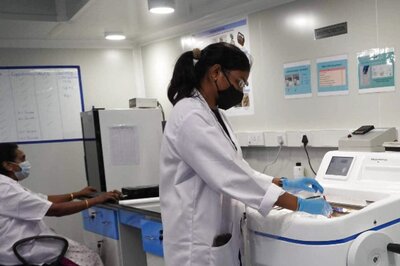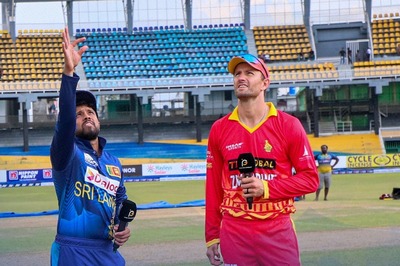
views
The Dwarka Expressway connecting Delhi to Haryana will be India’s first eight-lane elevated expressway meant to decongest NH-48 between Delhi and Gurgaon. Union Minister Nitin Gadkari said that the expressway will be open to public in the next 3-4 month.
However, the project is under controversy ever since the Comptroller Auditor General of India (CAG) flagged cost escalation in the construction of the Highway. While the CAG report stated that the construction cost of the expressway was pushed to Rs 251 crore per km from Rs 18.2 crore per km, the government refuted the claims saying it oversimplifies the complexity of the project.
Here is all you need to know about the Dwarka Expressway and the concerns regarding the cost of its construction:
Dwarka Expressway
The Dwarka Expressway is a four-pack motorway with a length of 563 kilometres. The road stretches between Shiv Murti on National Highway 8 to Gurugram’s Kherki Daula toll plaza.
When the project finishes, the connectivity between Delhi and Haryana will be greatly improved. The distance between Manesar to Dwarka and Indira Gandhi International Airport will significantly reduce after the construction of the Expressway.
Marvel of Engineering: The Dwarka Expressway! A State-of-the-Art Journey into the Future ????#DwarkaExpressway #PragatiKaHighway #GatiShakti pic.twitter.com/Qhgd77WatW— Nitin Gadkari (@nitin_gadkari) August 20, 2023
Nitin Gadkari shared a video of the Expressway on X, formerly known as Twitter, with the caption, “Marvel of Engineering: The Dwarka Expressway! A State-of-the-Art Journey into the Future.”
According to the video, the travel time from Dwarka to Manesar will become 15 minutes, Manesar to Indira Gandhi International Airport will become 20 minutes, Dwarka to Singhu border will become 25 minutes and Manesar to Singhu border will become 45 minutes. The project will also strengthen the connectivity of the International Convention Centre in Dwarka, Sector 25.
The cost of Rs 91,000 crore for 5,000 km under Bharatmala Phase-I project was finalised by the ministry on August 10, 2016, for the year 2016-17 to the extent possible.
The expressway was built using two lakh tonnes of steel, which is 30 times more than what was used to build the Eiffel Tower. Moreover, 20 lakh cubic meters of cement concrete, which is six times more than was used for the Burj Khalifa, were used for the project.
What Did the CAG report Said
The Comptroller Auditor General of India (CAG) report flagging cost escalation in the construction of Dwarka Expressway. According to the report, tabled in Parliament on August 10, the 29.06-km expressway was built at a “very high” cost of Rs 250.77 crore per km, far beyond the Rs 18.2 crore per km approved by the Cabinet Committee on Economic Affairs.
Apart from the elevated per-kilometre cost of the project, the CAG report also claims that the construction was sanctioned by the Road ministry without a detailed project report (DPR).
Ever since the Comptroller Auditor General of India (CAG) flagged cost escalation in the construction of Dwarka Expressway, the war-of-words have escalated between the government and the opposition on the issue.
The Aam Aadmi Party last week protested at the under-construction Dwarka Expressway as several party leaders including party leaders Priyanka Kakkar and Reena Gupta and workers gathered near the highway alleging that the project is a ‘scam’. Delhi Chief Minister Arvind Kejriwal had alleged that the Narendra Modi-led government has “broken all records of corruption”.
What the Govt Said
The government said that the CAG’s calculation method oversimplifies the complexity of the project. Union Road Transport and Highways Minister Nitin Gadkari said Dwarka Expressway was not 29 kilometres-long as mentioned in the CAG report, but around 230 kilometres-long including the tunnels made as part of the project. Gadkari said that according to this, Rs 9.5 crore was spent on every kilometre, according to India Today.
The CAG report didn’t include flyovers, elevated roads, underpasses, tunnels and ring roads as these additional components contribute significantly to the overall construction cost and were not originally included as part of the project.
Gadkari further added that he informed the CAG officials and they were convinced by the clarification. However, he said that they still went ahead with the report.
According to ministry sources, Gadkari conveyed his displeasure with the lopsided attitude adopted by certain officials in view of the queries raised by the CAG.
Govt Saved 12% in Construction Cost
The Ministry of Road Transport and Highways had claimed that the government saved over 12 percent in construction cost against estimates in awarding contracts for the expressway.
The ministry sources clarified that the CAG figures lack proper context. They clarified saying that all four contracts for the Dwarka Expressway were put out for tender at an average civil cost of Rs 206.39 crore per kilometre. Ultimately, the contracts were awarded at a substantially reduced rate of Rs 181.94 crore per km, which reflects a 12% reduction from the estimates.



















Comments
0 comment